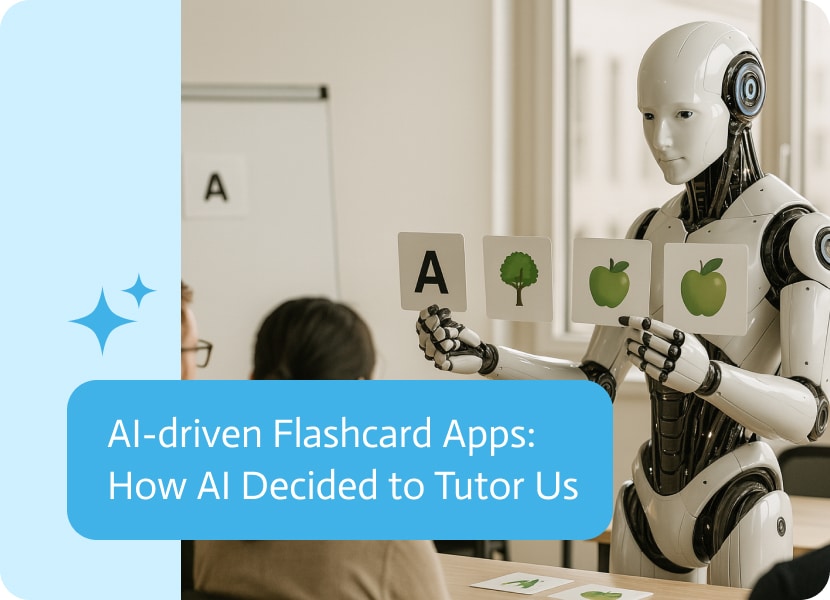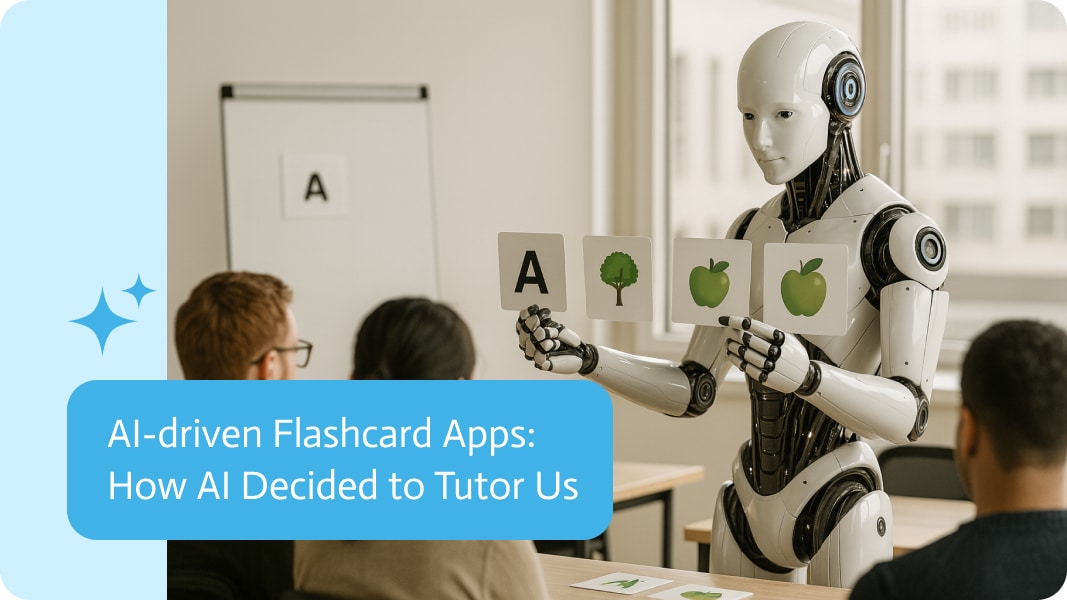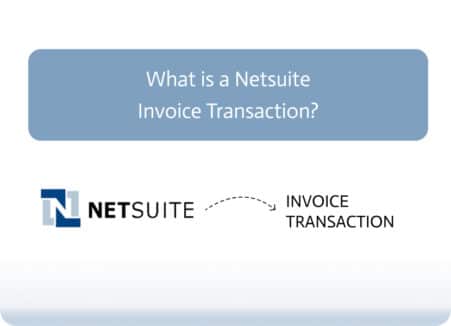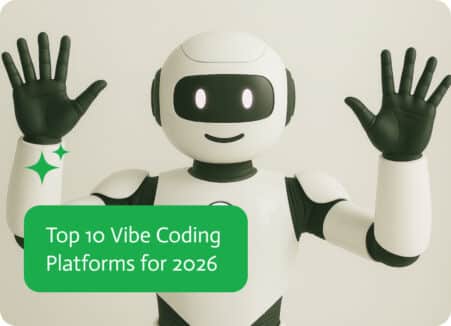

AI-driven Flashcard Apps: How AI Decided to Tutor Us
Flashcard applications powered by AI are modern study aids that enhance the efficiency and personalization of learning through the application of artificial intelligence. Unlike traditional apps that display cards randomly, AI-powered apps analyze your learning patterns and adapt in the moment to optimize your learning.
In the past, studying meant sitting on your bedroom floor surrounded by a mountain of paper flashcards, highlighters, and an overpowering sense of dread. You would sift through a hundred self-made cards and pretend to ‘study smart.’ In reality, you were just engaging in a chaotic game of memory roulette. Did it work? Maybe. Was it efficient? Only if you define “efficient” as the ability to memorize random facts while spiraling through caffeine-fueled panic attacks.
Greet the newest addition to the learning and education world: AI flashcard apps. These apps are the product of self-proclaimed computer whizzes who decided the process of learning should not feel like mental CrossFit.
What is an AI-based flashcard App?
So, picture the traditional flashcard system, but imagine they possess some sort of a memory, know how to keep time, and possess obsessive tendencies towards monitoring your overall performance. AI flashcard apps are not merely applications that showcase cards. They analyze the ways in which you learn and optimize your sessions around your peculiar and often forgetful brain circuitry.
These are not your grandma’s flashcards. Now, they are smarter, quicker, and a bit creepy in how much they know about you. Let’s find out how these digital overachievers operate, if they really work, and if they are indeed the study buddy you never thought you needed.
The Sexy Science Behind It: Spaced Repetition
The focus of most of these apps is on advancing spaced repetition. We understand it sounds robotic, but it is, in fact, a revolutionary learning technique worthy of winning a Nobel Prize.
Every brain starts to backtrack on the information they just learned, which is where spaced repetition comes to the rescue. It happens to everyone and works like a memory superhero at the same time.
It doesn’t randomly bombard you with flash cards like an uninterested child. It picks the last time you saw the card, including: time taken to answer, time taken to respond, and most importantly, how certain (or clueless) your response was. Then it schedules the next review with stunning accuracy. It’s just like having an attentive tutor.
AI = Always In Your Business (In A Good Way)
These apps are not only aware of your strengths and weaknesses; they go well beyond surface-level observation. Is it too much? Maybe. But we are here for it.
If you persistently fumble over definitions of photosynthesis, the app silently notes (judgment-free) and shuffles your flashcards. You’ll encounter that topic more frequently, without realizing it, being conditioned over time for peak retention.
It’s not manipulation, it’s…assistive strategy.
Flashcards that Write Themselves
Don’t feel like making your own flashcards? No worries, AI’s got you. Many apps can now generate flashcards from your notes, PDFs, textbook excerpts, and even YouTube videos.
Yes, that’s right. You can copy-paste your chaotic lecture notes into the app and let it magically pull key points and questions. It’s like having an overachieving TA trapped inside your phone, minus the overpriced coffee addiction.
Some even let you scan physical pages and convert them into flashcards. This is either black magic or really good OCR technology. Either way, it’s impressive.
Using Noca AI To Get Smarter Faster
Hey, teachers, startups, and product builders! Noca gives you what you need to build a great AI flashcard system. It’s not just a ready-made flashcard app, though. You can use Noca to make workflows that turn content into flashcards, change up how they’re given, and work with the tools you’re already using. No coding experience? No problem. You can still make use of Noca AI to construct the flashcard app that will aid with exam prep.
Progress Reports: Your Report Card
You know how gym apps track your reps and make you feel like a Greek god for doing five push-ups? AI flashcard apps do the same, but with knowledge. You get charts, graphs, and weirdly flattering statistics that tell you things like:
- “You’ve mastered 83% of world history!”
- “You remembered that biochem formula after only 3 tries!”
- “You’re 12 days ahead of the average student. Do you sleep?”
These apps give you an ego boost and a reality check in one useful package. They’ll also gently suggest areas you’re weak in, but with the soft tone of a therapist rather than a disappointed parent.
The Dark Side: What These Apps Can’t Do
Look, AI flashcard apps are impressive, but they’re not magic, they can’t:
- Force you to actually open the app and study.
- Stop you from doom-scrolling instead of reviewing Spanish verbs.
- Teach you things you’ve never input or uploaded—unless they go rogue and start auto-studying your browser history. (Let’s hope not.)
Also, when combined with real understanding, they show their true worth. If you’re trying to brute-force your way through an exam by memorizing definitions without context, the app definitely helps, but it can’t make sense of things for you. That part’s still on you, unfortunately.
Final Verdict: Worth the Download?
If you’re the type who wants to study smarter but often ends up binge-watching documentaries about studying, then yes, AI-driven flashcard apps might just save your academic bacon.
They’re smart, intuitive, and a bit unsettling in how well they track your cognitive quirks. But they do what old-school flashcards never could: adapt. They become your study partner, your data analyst, and your slightly nosy cheerleader.
And let’s face it: if something’s going to spy on us anyway, it might as well help us ace that biology exam.
TL;DR
AI flashcard apps:
- Learn how you learn
- Quiz you with machine-like timing
- Auto-generate cards from your chaos
- Track your progress obsessively
- Occasionally make you feel like a genius
So go ahead, delete one of your 17 meditation apps and give your brain something useful to do. You’ve got flashcards to conquer and a memory palace to build, AI’s just here to hold the blueprints.


